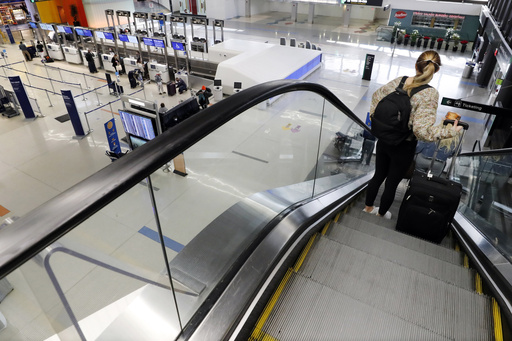BOSTON (AP) — Homeless families and individuals will be barred from sleeping overnight at Logan International Airport in Boston beginning July 9, state officials said Friday.
The state has made efforts to open more overflow shelter beds for homeless families, including many newly-arrived migrants who have used the airport as a last resort, said Massachusetts Gov. Maura Healey. Shelter stays have been capped, and with more families finding stable housing, the state is now in a position to end the practice of people staying overnight at the airport, said Emergency Assistance Director Scott Rice.
“This is in the best interest of families and travelers and staff at Logan, as the airport is not an appropriate place for people to seek shelter,” Rice said in a statement.
Families sleeping overnight at Logan who are on the state’s emergency assistance shelter waitlist will be offered transfers to the state’s safety-net system, including a Norfolk site that opened this week to accommodate up to 140 families at full capacity.
The number of families leaving shelter has steadily increased over the past few months, with more than 300 families leaving in May – the highest number in years, Rice said. But Massachusetts is still out of shelter space, he said.
“If families are travelling to Massachusetts, they need to be prepared with a plan for housing that does not include Logan Airport or our emergency assistance shelters,” he said.
Advocates for the homeless raised concerns about the airport ban. Given the caps on how many families can access emergency assistance shelter, Logan Airport has been an “inadequate yet crucial lifeline” this year for hundreds of children and parents waiting for long-term housing, said Kelly Turley, associate director of the Massachusetts Coalition for the Homeless.
Advocates called on the state to better address the root causes of the state’s broader housing affordability and homelessness crises.
Earlier this week, Healey sent a team of officials, led by Rice, to the southern border. They met with organizations that assist families at the border, including Catholic Charities and the Interfaith Welcome Coalition, to make sure they had what the administration described as “accurate, updated information to share about the lack of shelter space in Massachusetts.”
The administration will continue to get the word out through flyers in English, Spanish and Haitian-Creole.
The flyers not only say that the state’s shelters are full, but also include some basic sobering facts about the state, including that the average rent for a two-bedroom apartment is between $2,800 and $3,500 and that Massachusetts is “very cold in the winter and very hot in the summer.”
Also Friday, the Supreme Court allowed cities to enforce bans on homeless people sleeping outside in public places, ruling along ideological lines that such laws don’t amount to cruel and unusual punishment, even in West Coast areas where shelter space is lacking.


